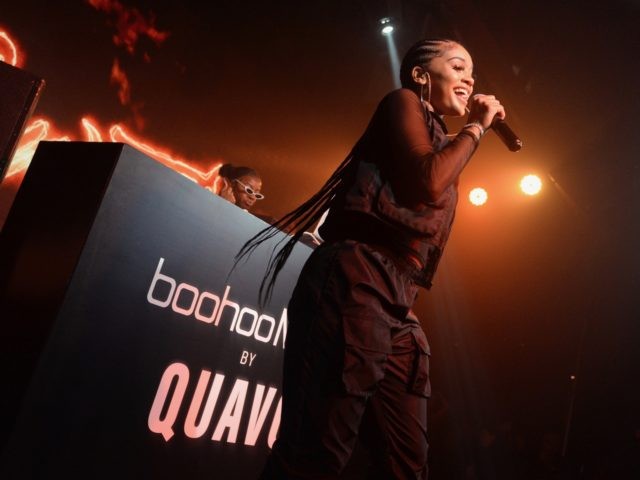Black Lives Matter supporting fast-fashion giant Boohoo and its suppliers are facing an import ban from the United States over allegations that the British-based company employs slave labour.
During the height of the Black Lives Matter unrest in the U.S. and the UK last summer, Boohoo’s social media account took up the Hollywood trend of posting an image of a black square alongside the hashtag #blackouttuesday in supposed solidarity with the Marxist BLM movement.
Just one month prior, however, the company was embroiled in a scandal over the use of alleged slave labour in its factories in the industrial British city of Leicester. Boohoo denies the claims.
Now, the company is facing a possible investigation from U.S. Customs and Border Protection following a series of petitions launched by a campaign group that fights against modern-day slavery.
British lawyer Duncan Jepson, who runs the Liberty Shared campaign group, told Sky News: “The evidence of Boohoo and forced labour is quite compelling. I think it will be a wake-up call for British institutions about how they’re handling modern slavery enforced labour, particularly in a community like Leicester East.
“What we’d all like, those of us interested in improving labour conditions is for Boohoo to really get to grips with governance of their supply chain to ensure there is no wage theft and people have proper contracts.
“It must look at all 11 indicators the International Labour Organisation sets out for forced labour and see there is compliance with those.”
We're listening. #BlackOutTuesday pic.twitter.com/vIl6UMOsp6
— boohoo (@boohoo) June 2, 2020
The Tariff Act of 1930 in the United States prohibits the import of any foreign merchandise that has been “mined, produced or manufactured, wholly or in part, in any foreign country by forced or indentured labour” with products being liable to seizure or expulsion. Companies found responsible also face criminal investigations.
The UK’s former anti-slavery commissioner Kevin Hyland said that if the United States determines there is modern slavery occurring in Boohoo’s supply chain in Leicester, then the potential sanctions from the US could be “enormous”.
“The aim of the petitions is very clear, that companies which think they can benefit from forced labour and the exploitation of others are shown that they cannot and will face a sanction that they can’t trade in the world’s largest economy,” he said.
“But what it will do as well is create a gap for good businesses to come in and pay people properly,” Hyland added.
In 2020, American sales accounted for more than one-fifth of Boohoo’s total revenue, at £263.6 million ($366.72m). The company, founded in 2006, is believed to be one of the UK’s fastest-growing fashion brands, with some 14 million online customers.
Despite the widely publicised accusations of modern slavery, the company saw its revenue rise by 40 per cent last year to £1.235bn, with £92.2 million in profits.
Last July, an investigation from the Sunday Times claimed that workers at the Boohoo’s factories in Leicester were being paid as little as £3.50 an hour, less than 40 per cent of the national minimum wage for adults over 25 of £8.72 an hour.
Delingpole: Slavery Is Still Rife in Britain. So Where Are the BLM Protests? https://t.co/wJCKu2H4Gv
— Breitbart London (@BreitbartLondon) July 14, 2020
Home Secretary Priti Patel has suggested that “cultural sensitivities” led police and other government agencies to ignore the exploitation of illegal workers in textile factories and warehouses in Leicester, similar to how police overlooked grooming gang rapists operating in cities like Rotherham and Rochdale.
Knowledge of modern-day slavery in the fast fashion factories of Leicester has been held since at least 2015. However, the police have been accused of being reticent to crack down on the trade out of politically correct fears.
The issue has also been tied to illegal immigration, with a report from the Centre for Social Justice finding that trafficking networks are thought to be working with local criminals in order to exploit illegal immigrants from the Middle East and Eastern Europe, who are trapped in “debt bondage” accumulated during their journey to enter the UK illegally.
The chairman of the Textile Manufacturers Association of Leicestershire, Saeed Khilji, claimed that have conditions in the factories have since improved.
“If the American government took action and if they have enough evidence to do that, yes there will be an effect, but I’m sure now on there won’t be a problem in Leicester. I’m 100% confident,” he said.
In a statement, Boohoo said: “Over the past eight months we have been working closely with UK enforcement bodies and it is important to note that auditors and investigators who are forensically examining suppliers in Leicester have found no evidence of modern-day slavery.
“We have taken action against 64 suppliers who did not meet the group’s standards in the levels of transparency that business requires.”
The company went on to claim that they have not been notified of any investigation from the U.S. Customs and Border Protection, claiming that they believe they are in line with the regulations against modern slavery.
Coronavirus Exposed Modern Day Slavery Trade in the UK, Says Former Tory Leader https://t.co/IIYByj0LqB
— Breitbart London (@BreitbartLondon) August 16, 2020
Follow Kurt Zindulka on Twitter here @KurtZindulka

COMMENTS
Please let us know if you're having issues with commenting.